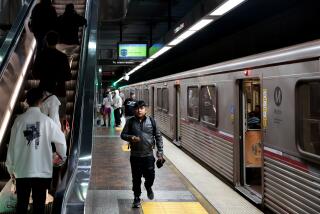U.S. Drops Probe of Fired Tunnel Contractor
- Share via
Federal prosecutors have dropped their criminal investigation of a subway contractor accused of using substandard materials in building the tunnels under Hollywood Boulevard.
The U.S. attorney’s office informed Shea-Kiewit-Kenny this week of its decision, nearly 2 1/2 years after the tunnel builder was fired by the Metropolitan Transportation Authority and its offices were raided by federal agents.
A dispute rages on in the civil courts between the MTA and the tunnel builder, which have sued each other in a case with a potentially big impact on taxpayers. Each is seeking about $100 million from the other.
A lawyer for Shea-Kiewit-Kenny said the U.S. attorney’s decision will assist the contractor in its wrongful termination lawsuit against the transit authority.
“The government’s decision removes any possible justification for MTA’s firing of SKK,” said John F. Shea, president of J.F. Shea Co. “SKK’s termination has already cost taxpayers more than $60 million in overruns and will cost substantially more by the time we are compensated for our losses.”
Daniel J. McLoon, a private attorney hired by the transit authority, responded, “Just because there is no criminal prosecution doesn’t mean there can’t or shouldn’t be a civil prosecution for fraud, and there will be.”
Assistant U.S. Atty. Marc S. Harris confirmed his office’s decision not to prosecute but declined to explain why.
Shea-Kiewit-Kenny came under investigation after a section of Hollywood Boulevard sank up to 10 inches in 1994, resulting in hundreds of claims and lawsuits against the MTA by property owners and prompting federal authorities to temporarily suspend funding for the massive public works project.
Transit officials fired the tunnel builder in July 1995 after an extraordinarily troubled period of subway construction, including the infamous Hollywood sinkhole, which occurred several months after the street sinkage.
The contractor sued the MTA, and the MTA countersued, seeking to recover the added cost of bringing on new contractors to complete the tunnels, including the millions of dollars spent to repair the sinkhole. No trial date has been set.
Both the criminal investigation and the civil lawsuit dealt with the contractor’s use of less-expensive wooden wedges rather than steel bracing in the tunnels. Federal agents who carted off boxes of documents from the company’s offices in 1995 had been looking for evidence that the contractor lied in certifying that the work was up to specifications, according to an affidavit filed to obtain a search warrant. The federal government is helping to fund the $6.1-billion subway construction.
The MTA has contended that the wedges were substandard, an assertion that the company disputes. Representatives of the construction management firm also accused the tunnel builder of concealing deficient work from inspectors, another allegation that the tunnel builder disputes.
Shea-Kiewit-Kenny representatives have maintained that the wood wedges--the use of which was approved by project engineers--did not cause the sinkage.
Ironically, Shea-Kiewit-Kenny and the MTA--adversaries in one civil suit--find themselves on the same side, named as defendants in the suits brought by Hollywood businesses.
John Morrissey, attorney for Shea-Kiewit-Kenny, said MTA’s own experts concluded that the subsidence was the result of unusually unstable ground conditions and water from leaking underground water pipes, caused, at least in part, by the Northridge earthquake.
McLoon said MTA’s case against the contractor “doesn’t depend on what caused the surface subsidence. It depends on proving that defective material was used [and] that it was fraudulently substituted.”
More to Read
Sign up for Essential California
The most important California stories and recommendations in your inbox every morning.
You may occasionally receive promotional content from the Los Angeles Times.











